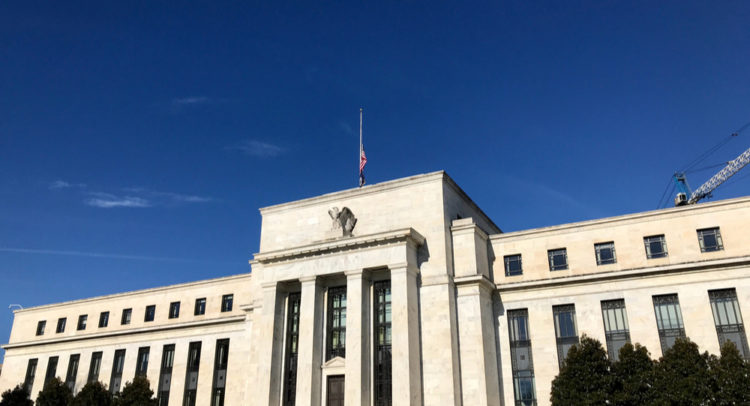The Federal Reserve and Bank of England remain dovish in their view that inflation is transitory, taking a gradual approach in rolling back monetary easing.
Discover the Best Stocks and Maximize Your Portfolio:
- See what stocks are receiving strong buy ratings from top-rated analysts.
- Filter, analyze, and streamline your search for investment opportunities with TipRanks’ Stock Screener.
FOMC Begins Tapering but Maintains View on Inflation
The Federal Reserve is about to begin tapering, the rolling back of purchases of Treasury Bonds and Mortgage-Backed Securities, by the end of November. However, tapering will be gradual. It will depend on the pace of the economic recovery and the two key variables that the Fed closely monitors, employment and inflation.
Here’s a quote from the FOMC statement issued following its regular meeting this week:
“In light of the substantial further progress the economy has made toward the Committee’s goals since last December, the Committee decided to begin reducing the monthly pace of its net asset purchases by $10 billion for Treasury securities and $5 billion for agency mortgage-backed securities.”
The FOMC then continued: “Beginning later this month, the Committee will increase its holdings of Treasury securities by at least $70 billion per month and of agency mortgage backed securities by at least $35 billion per month. Beginning in December, the Committee will increase its holdings of Treasury securities by at least $60 billion per month and of agency mortgage-backed securities by at least $30 billion per month. The Committee judges that similar reductions in the pace of net asset purchases will likely be appropriate each month, but it is prepared to adjust the pace of purchases if warranted by changes in the economic outlook.”
Meanwhile, the FOMC sticks with the long-held view by Chair Powell that inflation is transitory, meaning that tapering may not necessarily lead to tightening.
Here’s another quote from the FOMC statement:
“Inflation is elevated, largely reflecting factors that are expected to be transitory. Supply and demand imbalances related to the pandemic and the reopening of the economy have contributed to sizable price increases in some sectors.”
Meanwhile, the Fed chair clarified, once again, that tapering isn’t the same as tightening. “Powell made sure to let everyone know rate increases are not even part of the discussion right now,” says Chris Gaffney, TIAA Bank President of World Markets.
“He feels we have a ways to go on the labor front before the FOMC even begins to discuss rates. The fear of a 2015 early rate increase mistake is still fresh on the minds of policymakers and they will therefore have a lot of patience with inflation over the next several months.”
Financial markets liked the Fed’s dovish view, staging a “relief rally” led by the technology sector.
Bank of England Follows Suit
Taking its cue from the FOMC, the Bank of England maintained its dovish stance on inflation as well, keeping its policy unchanged.
Giles Coghlan, chief currency analyst at HYCM, was surprised by this move. He stated: “Just like the U.S. Federal Reserve yesterday, the BoE has decided to hold fire on a rate rise. This dovish decision is more of a surprise though; speculation had been rife that they would hike rates – but evidently, the BoE is wanting more time before taking such action.”
Nonetheless, Coghlan thinks that’s the right policy: “There is logic to this. Inflation might be rising, but the BoE is right not to consider an interest rates hike as a silver bullet to this problem. Labor data is crucial, and by deciding to postpone hiking rates, the MPC is likely waiting for more jobs data to become available following the end of the furlough scheme.”
Bottom Line
Investors should join central bankers in closely following how the two critical variables of employment and inflation behave as the global economy returns to normal.
Disclaimer: The information contained in this article represents the views and opinion of the writer only, and not the views or opinion of TipRanks or its affiliates, and should be considered for informational purposes only. TipRanks makes no warranties about the completeness, accuracy or reliability of such information. Nothing in this article should be taken as a recommendation or solicitation to purchase or sell securities. Nothing in the article constitutes legal, professional, investment and/or financial advice and/or takes into account the specific needs and/or requirements of an individual, nor does any information in the article constitute a comprehensive or complete statement of the matters or subject discussed therein. TipRanks and its affiliates disclaim all liability or responsibility with respect to the content of the article, and any action taken upon the information in the article is at your own and sole risk. The link to this article does not constitute an endorsement or recommendation by TipRanks or its affiliates. Past performance is not indicative of future results, prices or performance.









